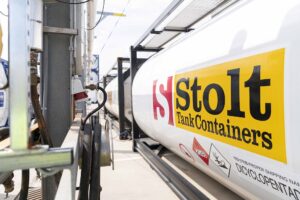Sustainable cleaning solutions

STC has been trialling new processes at its cleaning depots to recycle water and energy, as well as minimise the need for additives and detergents.
This is resulting in significantly less waste, lower costs and a more planet-friendly tank-cleaning operation, according to the company.
STC’s Moerdijk terminal in the Netherlands is one example of how the process works.
The system installed there recently is expected to reduce wastewater discharge by 70% and retain the wastewater for reuse at a temperature of 23°C so it does not require as much energy to reheat.
Water recycling
Wastewater from tank container cleaning processes is being drained into the STC depot’s wastewater installations, where it is processed via state-of-the art technology for re-use.
This involves the separation of oils and fats, physical chemical treatment, biological treatment and enhanced effluent polishing incorporating ultrafiltration, nano-filtration, active carbon absorption and sand filtration.
The cleaned water is of drinking quality standard, which makes it good enough to use all over again for the cleaning chemical tank containers.
Thanks to the new system, freshwater usage at Moerdijk will be reduced by 21,000m3 per year. Additionally, the discharge of wastewater into the public sewer will also decrease from 30,000–9,000m3 per year.
Energy efficiency
Heating water to perform high-pressure cleaning, dissolve product residue and flush waste requires a lot of energy.
This is because the optimal temperature for cleaning tank containers is about 85°C, while water coming out of the mains is typically around 11°C.
However, STC has invested in special rotating heat exchangers at Moerdijk, meaning they can recover a large proportion of the thermal energy in the wastewater that is been used for tank container cleaning.
This provides a starting point of 23°C (instead of 11°C), meaning there is 12 degrees less water heating to do. This, therefore, results in a huge saving in natural gas consumption.
What i more, this transfer of heat cools the wastewater to a point where it enables the oil fat separator to operate more efficiently.
Moerdijk’s consumption of natural gas is expected to reduce by 57,000m3 per year, saving 37,000kg of carbon emissions. That is equivalent to one year of household gas consumption for every employee (45) at the Moerdijk depot.
Reducing detergents and additives
The re-usable water that comes out of the facility’s enhanced filtration system is very low in salts and minerals.
This soft water does not require additives prior to being re-heated in the boilers and reduces the amount of detergent needed for effective cleaning.
As a result, STC expects to reduce chemical consumption by around 2,000 kg a year at at Moerdijk.
For more information: Visit: stolt-nielsen.com







